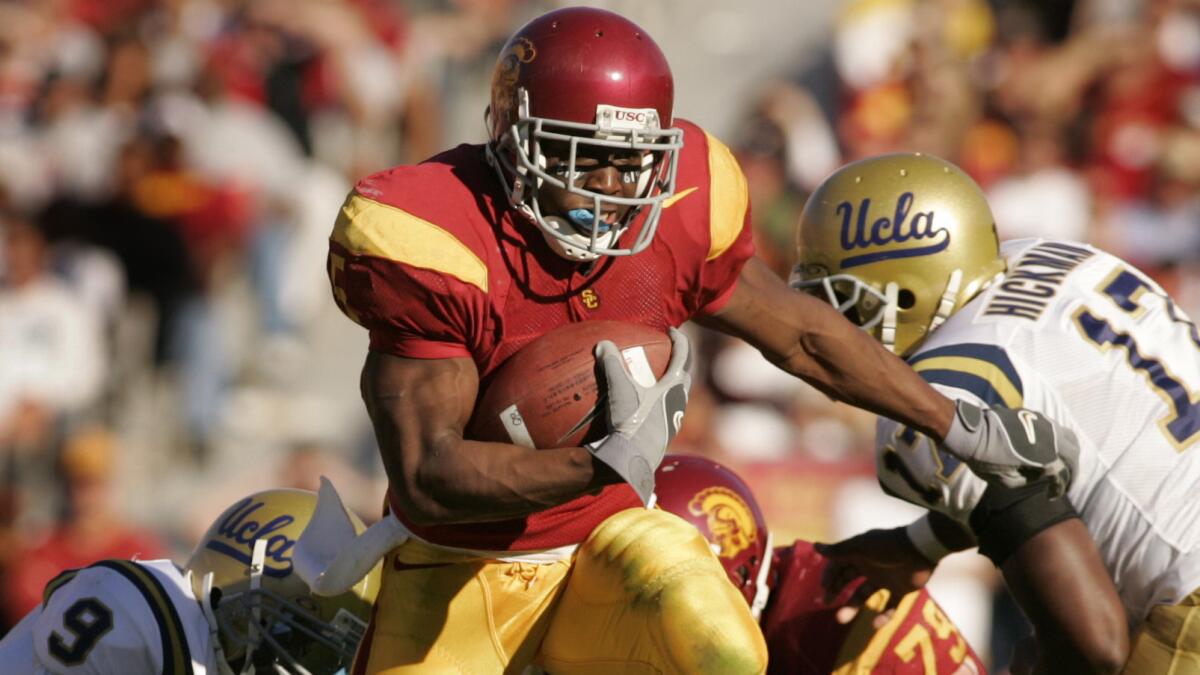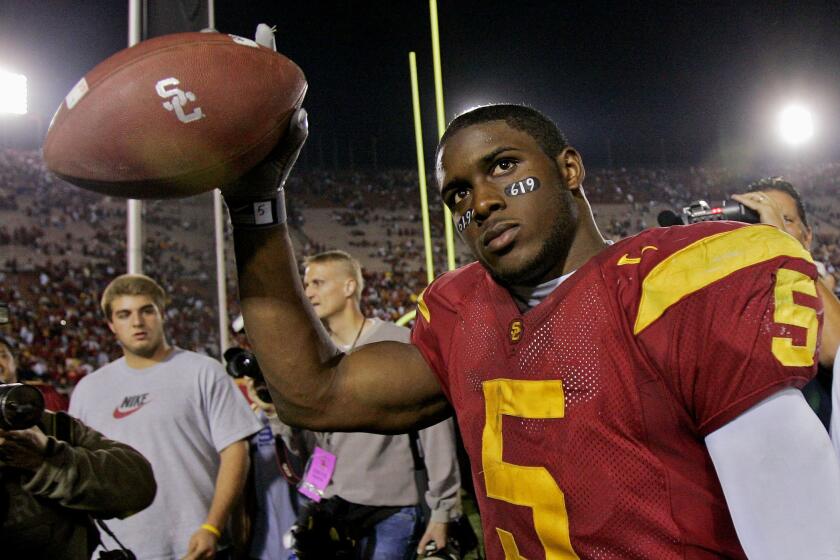Reggie Bush is welcomed back to USC after 10-year NCAA ban

USC and Reggie Bush reunited Wednesday when the university said in a news release that the former Heisman Trophy-winning running back would be welcome on campus now that a 10-year NCAA sanction had been lifted.
“I am pleased to inform you that all restrictions and prohibitions on your involvement in our athletics program are officially removed and you will be afforded the privileges and courtesies extended to all Trojan football alumni,” USC President Carol Folt said in a letter to Bush.
For Bush, one of the most electrifying players in college football history, the announcement was a long time coming.
“I’ve dreamed of this day for 10-plus years,” he said in a statement, “and I’m excited to come home.”
Bush, who did not respond to interview requests from the Los Angeles Times, told FS1 on Wednesday that the decade spent away from USC was “very tough.”
On June 10, 2010, the NCAA’s Committee on Infractions cited USC for a lack of institutional control and slapped the school with stiff sanctions after Bush was found to have accepted improper benefits. The school was ordered to permanently disassociate from Bush.
With Reggie Bush’s NCAA ban finally over, USC should embrace the running back and give him the opportunity to explain himself.
In 2017, that ban was adjusted by the NCAA to 10 years. It came to an end Wednesday.
“I went through a lot as a man,” Bush said in the FS1 interview. “A lot of my confidence as a man was shot down. I had some struggles throughout my career in the NFL because of the things I went through at USC. …”
“This always lingered in the back of my head. It’s the thing that kept me up late at night and haunted me as well.”
USC athletic director Mike Bohn, who was hired in November, said that it had become clear since he came on campus how much Bush’s presence meant to former players and fans. He singled out Matt Leinart, the 2004 Heisman Trophy-winning quarterback who handed off to Bush, as a driving force behind convincing USC’s new leadership to rekindle the relationship.
Still, Bohn said both he and Folt met with Bush before officially welcoming him back. Those conversations were “candid and heartfelt.” Bush expressed “his remorse,” Bohn said, and shared “the challenges of what this meant to him and the devastation he had experienced” when the sanctions were handed down.
“I think that was really important to us and being able to hear that from him,” Bohn said.
Bush did not offer that remorse publicly on Wednesday, but Bohn said he felt Bush’s “remorse and understanding of what it did to him personally” would be “incredibly valuable to our athletes.”
He also pointed to how much the landscape in college athletics had changed since 2010, when the NCAA first delivered its sanctions.
The Trojans were stripped of their 2004 Bowl Championship Series national title and were forced to vacate their final two wins from that season and all of their victories from 2005. The NCAA banned USC from the postseason in 2010 and 2011, docked 30 scholarships over three years, and placed the program on probation for four years.
As Bush went on to a successful NFL career, earning more over the course of his career than all but two running backs in league history — Adrian Peterson and Edgerrin James are one and two, respectively — his legacy at USC was all but erased.
His name and image were scrubbed from campus. His jersey in the Coliseum was removed. An asterisk was attached to his school records. His Heisman was returned.
The NCAA is not expected to restore the USC victories that were vacated, nor is the Heisman Trust expected to reinstate Bush as the 2005 recipient of the award.
Bohn said he was unaware of the process for how — or if — Bush’s trophy could be returned, while Bush noted that his forfeited trophy was “in the past” and that he was “more focused on the kids now.”
The interaction between Reggie Bush and the Trojans football team highlighted the absurdity of forcing USC to continue to dissociate itself from the Heisman Trophy-winning running back.
When asked whether he wanted his Heisman back, Bush said, “Hell yeah.”
“To say I don’t want it back would be a lie,” he continued. “So I do want to be completely honest about that. One hundred percent I want my Heisman Trophy back.”
In addition to Bush, the university announced that former Trojans basketball player O.J. Mayo, who was also barred from campus by the NCAA in 2010, was welcome to return.
Mayo, the third pick in the 2008 draft, played in the NBA until 2016, when he was banned from the league for a drug violation. He signed with a team in Taipei in 2019. He could not be reached for comment.
More to Read
Go beyond the scoreboard
Get the latest on L.A.'s teams in the daily Sports Report newsletter.
You may occasionally receive promotional content from the Los Angeles Times.









